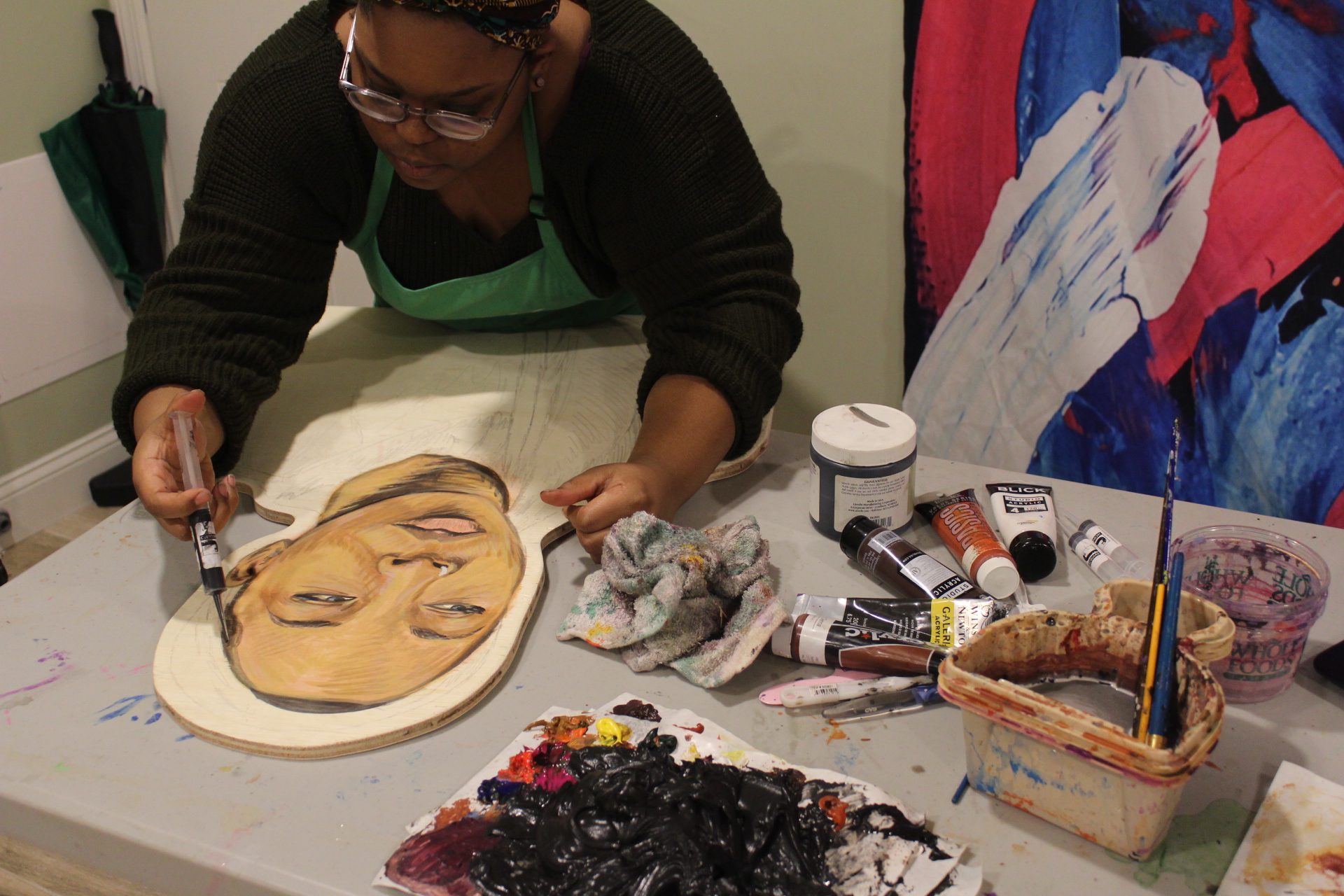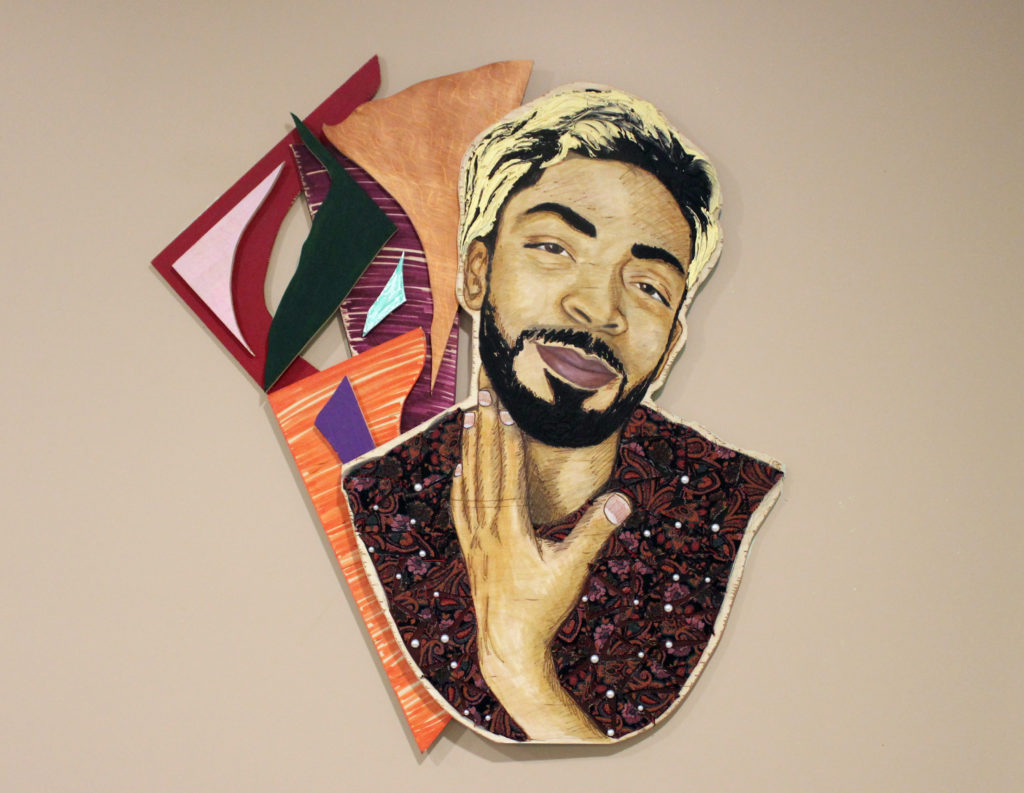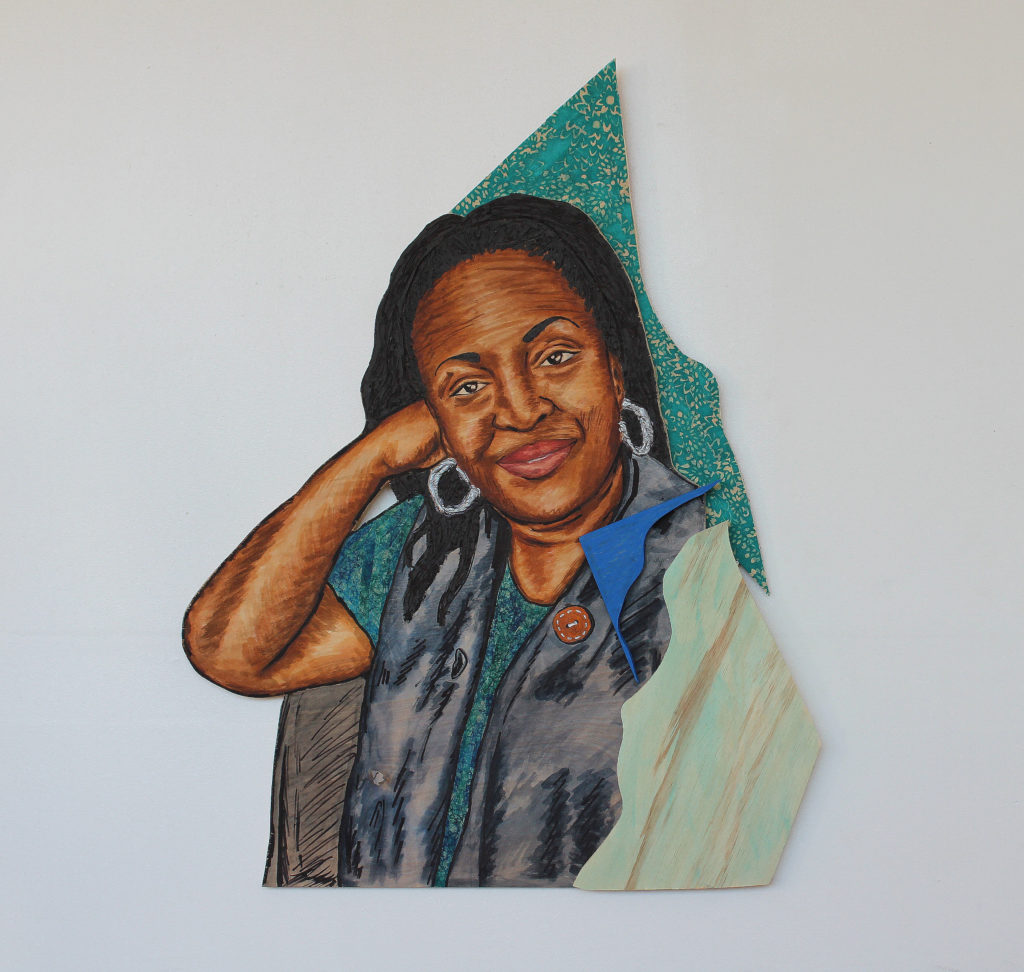We are pleased to announce our Spring 2024 interns at A&BC! Our internship program is…

Chanel Thervil on Self-Care, Creativity, and Collaboration during COVID-19
Chanel Thervil, the multi-faceted artist and educator behind the current exhibit at the Children’s Museum of Boston, titled “Warm & Fuzzy Feels”, recently bought her first tricycle. She takes it out for a joy ride twice a week (at most) to breathe new life into her creative works in the midst of COVID-19.
“It’s been hard for me to find a routine,” she says, “but my own self-care is ever-evolving as I evolve. And there’s no ‘one size fits all’ for that.”
Among Thervil’s vault of creative mastery, perhaps her most visceral commodity lies within her ability to pull back the veil of her process, to unravel an honest message, and to flood her work with candid panache.
In short: her humanity.
Thervil has found success across the Northeast and beyond serving as a Creative Arts Fellow for ABC. Her work has also been featured in The Urbano Project, PBS Kids, and a meadow of striking public art installations. Thervil’s pieces adopt the texture of tangible livelihood, thoughtfully illustrating real people and real things, mostly across Boston proper. Her roots, however, dig deep into the Haitian-American landscape, brimming with color and community, two top-shelf ingredients that form the base of her craft.
“Subconsciously, I explore my roots through the colors I use,” Thervil explained. “Growing up in Miami, my ties to those Caribbean roots were more potent, because the color palettes were so delicious, vibrant, energizing.”
Of her most recent projects, Thervil’s ongoing self-care portraits display the widest range of color for the subjects bleed shades as unique as their stories.
“This is the first series I’ve done with live interviews, and a big push for that is the pandemic,” Thervil said. “I’m focused on honoring the everyday person, the ordinary person doing extraordinary things. I view their words, their stories, as inspiration.”
The subjects are presented in an almost fabled manner, like the protagonist of childhood lullabies. And yet, these people are real. They work alongside us, pushing the tides out when we forget to observe, and rewarding the ones who remember to pay attention.
“I get a lot of questions from folks asking, ‘who is this person?’ and I’m like, yes this is a real human!” Thervil said. “Truly, there aren’t enough people giving flowers to folks who can smell them.”

As a young creative, Thervil found her tribe amongst fine art displays in museums throughout New York and prides herself on taking friends and family to exhibits so that they can enjoy the same warmth she found in those walls.
COVID-19 has painted a new reality for us all, and the arts continue to challenge the way we interact with the same work we find in museums on a different scale. Back in June, Thervil participated in the Public Space Invitational, hosted by New Urban Mechanics, a design lab powered by shared spaces and fellowship. The project looked to Boston’s community gardens (such as El Jardin de la Amistad in Roxbury) as a source for togetherness in times of remoteness. Thervil fashioned flowerpots in her signature kiss of color, offering the final products to Boston residents as a gift and a means to harmonize with nature.
“I don’t have a green thumb and have killed many a cactus,” Thervil jokes, “but this was a way to get people to tap into their community gardens, and as an extension, with each other.”
In this way, we’re able to give flowers to those who can smell them.
The roads of Roxbury are changing and Thervil finds her artist community developing in tandem.
“There’s a long history of black people gathering together and doing great things here, and it’s really exciting to be able to live in a space where I know there are elders who have legacies in the arts,” she said.
The gentrification of neighborhoods like Roxbury poses a challenge to existing residents, who make up the very fabric that spools out its charm. These legacies cannot afford to be silenced, which is why Thervil’s creative presence in such a space is vital to its longevity.
“As beneficial as new things can be, there is a sense of wondering if you’re being erased,” Thervil said, “how can we support the people who are here, right now?”
This principle of allyship is the groundwork for Thervil’s project with Cicada, the tech-savvy artist collective who’s steering the ship of tomorrow’s digitized creatives. The project, titled “Art at a Distance”, brings artists to their computers for a collaborative crash creation with zero contact, proving that art expands beyond what we physically engage with. Thervil joined forces with animator Kate Costello to invent a piece made for live-streaming. To do so, Thervil needed to step into the digital void.
“I lucked out getting paired with the animator in the group!” She said, “it was a learning curve for sure, but thankfully Kate was so patient with me. It was great to have a partner who was willing to meet you halfway.”
The concept of allyship was born out of the duo’s introductory conversations, which so happened around the time of George Floyd’s death.
“We thought, ‘here’s our opportunity to say something,’” Thervil explained, “there’s this undercurrent to want to attach yourself to what’s trendy, rather than a long-term goal. The ways people are communicating with each other tend to be with that short-term goal in mind, and Kate and I were very much in agreement with that.”
Thervil and Costello created a charming cut-and-paste, stop-motion animation that promotes sustainable ideologies over click-bait material.
“We both have things we can teach each other, and we hope people commit to this life-long process,” Thervil said.
While not the coziest medium to present art with a purpose, the method of tag-teaming from afar can be surprisingly intimate. If your bodies can’t work together in the same space, then your ideas will lead the tango.
Unique relationships amongst other women were the inspiration behind Thervil’s latest work on display at the Children’s Museum of Boston. The exhibit, “Warm & Fuzzy Feels”, looks at the dynamic friendships that women cultivate in a variety of circumstances, showing youngsters that it’s ok to befriend someone a little different from you.
“I don’t think American society sees it this way, but friendships are very intimate relationships,” Thervil said. “As an adult, I’ve been thinking about how difficult it can be to develop friendships as you get older. We have to encourage children not to think in barriers.”
Thervil’s extensive work in art education has provided her with countless opportunities to light a candle with aspiring artists.
“My best advice for kid creatives is to make the thing, even when no one’s looking!” Thervil said, “it’s through the doing, that you learn. You don’t just snap your fingers and suddenly, you’re an artist! There’s a lot of frustration, trial and error…that’s the not-so-glamorous aspect that we need to normalize, especially for young artists.”
Thervil recalls the early days of watching hours of YouTube content on which glue works best, or which brand holds up on the market.
“To be an artist is to be a researcher, too!” She said, “we do young people a disservice when we just say, ‘you’ll figure it out’ because it’s a lot of work.”
Today, Thervil continues with her self-care series, with a few museum collaborations on the horizon.
“I haven’t really been able to think about the future,” she said, “I’ve been focusing on the present, and I want to continue to make artwork that evokes a sense of hope, that energizes and inspires people.”
In a world that feels increasingly singular and remote, perhaps we all need a little more Thervil in our lives. A little more honest humanity.



